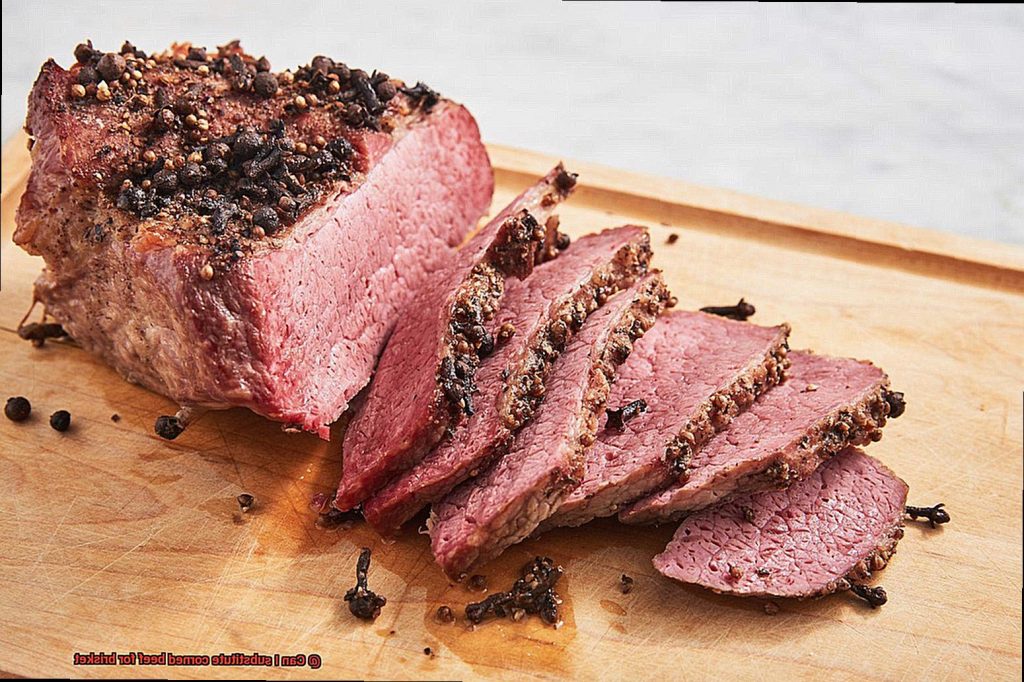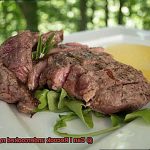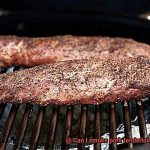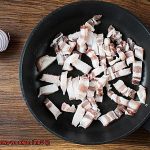Do you find yourself in a predicament where you’re short on brisket for your recipe, but have some corned beef tucked away in your pantry? Or maybe you’re just curious if these two meats can be switched out interchangeably. Either way, the question remains: Can I substitute corned beef for brisket? The answer is a resounding yes, but with some caveats.
Corned beef and brisket both come from the same part of a cow – the breast or lower chest. While they share similar beefy flavors, their preparation methods can make all the difference in terms of taste and texture. Brisket is typically smoked, slow-roasted, or braised to tender perfection, while corned beef is brined in a saltwater solution with pickling spices like coriander and mustard seed, resulting in its signature tangy flavor.
If you’re thinking of using corned beef as a stand-in for brisket, there are a few things to keep in mind. Corned beef tends to be saltier and denser than brisket, so it may require adjustments to seasoning and cooking times. But fear not – with some recipe tweaks and creativity, corned beef can make an excellent substitute for brisket in dishes such as stews, casseroles, sandwiches and more.
In this blog post, we’ll delve deeper into the nuances between corned beef and brisket and provide tips on how to use corned beef successfully as a replacement for brisket. So let’s get started.
Contents
What is Corned Beef?
Corned beef, a popular meat that has been enjoyed for centuries, is a salt-cured beef brisket that is typically boiled or slow-cooked. The “corned” in its name refers to the large grains of salt, known as “corns,” used in the curing process. This method gives corned beef its unique salty flavor and tender texture, making it a perfect ingredient for slow-cooked dishes like corned beef and cabbage.
Corned beef differs from regular brisket in that it has been soaked in a brine made of water, salt, sugar, and spices. This curing process changes the texture of the meat, making it more tender and flavorful than regular brisket. Corned beef can be found in different cuts, including whole briskets, flats, and points.
Although corned beef and brisket come from the same cut of meat, they are not interchangeable in recipes. Corned beef has already been heavily seasoned and cured with salt, so substituting it for regular uncooked brisket can alter the taste of the dish significantly. Additionally, corned beef tends to be more tender and fatty than regular brisket, which can affect the texture of the final dish.
If you’re looking to grill or smoke corned beef, be sure to rinse it thoroughly before cooking to remove any excess saltiness. You may also want to adjust your seasoning or marinade to account for the saltiness of the corned beef. However, when considering substituting corned beef for brisket in a recipe, keep in mind the differences in flavor and texture to ensure that the final dish turns out as intended.
What is Brisket?
Get ready to learn everything you need to know about brisket – a delicious cut of beef that’s become a favorite for smoking, grilling, and barbecuing. As an expert on all things meaty, let me give you the lowdown on brisket.
To start, brisket is derived from the breast section of a cow and is a large piece of meat. It can be quite tough if not cooked properly, but when prepared correctly, it’s incredibly tender and packed with flavor. Its unique texture and size make it perfect for smoking, grilling, and barbecuing.
It’s important to note that there are two different cuts of brisket you should be aware of: the flat cut and the point cut. The flat cut is leaner and has less fat content than the point cut, while the point cut has more marbling and fat to make it juicier and more flavorful. Depending on your taste preference or the recipe you’re using, one cut may be more suitable than the other.
Traditionally, brisket is a staple in Texas-style barbecue. To achieve that irresistible flavor, it’s seasoned with a dry rub and smoked low and slow for up to 18 hours. However, if you don’t have access to a smoker, you can always braise or roast it in the oven – this will help to tenderize the meat while infusing it with delicious flavors.
Brisket is an incredibly versatile cut of meat that can be served on its own or incorporated into various dishes like tacos, sandwiches or stews. It is also a great option for meal prepping because it reheats well.
It’s worth noting that corned beef is not the same thing as brisket. While corned beef is made by curing brisket with salt and other seasonings which gives it a distinct flavor and texture, it cannot substitute for actual brisket in most recipes.
Similarities Between Corned Beef and Brisket
Let’s start with the basics: did you know that corned beef is simply a brisket that has been cured in a brine solution with salt, sugar, and spices? While the corning process gives corned beef its distinct flavor and pink color, it also makes it more tender than uncooked brisket. However, both cuts of meat have lots of connective tissue, making them ideal for slow cooking methods such as smoking or braising.

When it comes to flavor, both corned beef and brisket have a rich, beefy taste that pairs well with bold ingredients like garlic and onions. They also have similar nutritional profiles and can be slow-cooked to perfection. Corned beef is usually boiled or simmered in liquid to achieve a tender texture while brisket is often smoked or braised for hours to create a melt-in-your-mouth texture.
But can you substitute corned beef for brisket in your recipes? Yes, but keep in mind that the added spices and curing process of the corned beef may affect the dish’s flavor. Additionally, cooking times may need to be adjusted since corned beef is typically more tender than uncooked brisket.
Differences Between Corned Beef and Brisket
Let’s dive in and discover what sets these two cuts of meat apart.
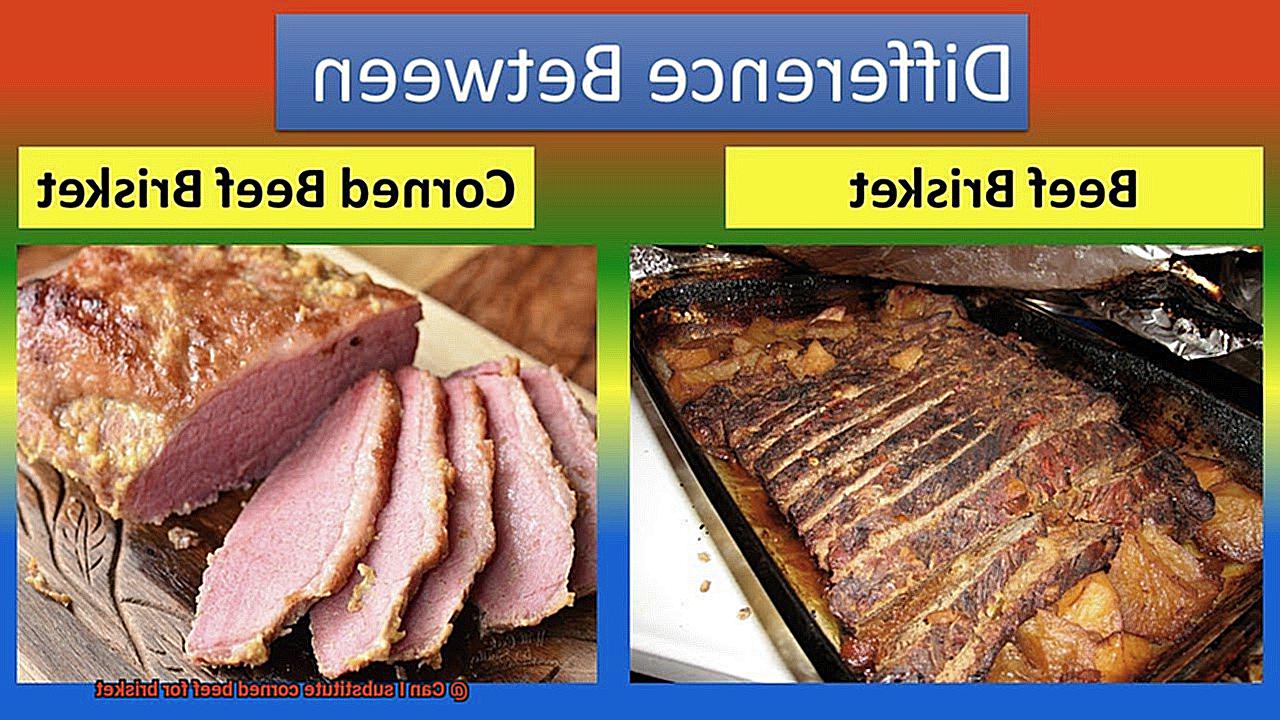
Firstly, brisket is a cut of beef that comes from the lower chest area of the cow, while corned beef is a salt-cured cut of beef that can come from various parts of the cow. The flavor profile of these two meats is where we see the most significant difference. Corned beef has a tangy, salty flavor due to the curing process, while brisket boasts a more robust, beefy flavor.
Texture and cooking methods are also areas where these cuts differ. Corned beef has a slightly different texture than brisket because it has been cured in brine, resulting in a more tender and moist meat. Typically, corned beef is boiled or slow-cooked, while brisket is renowned for its ability to shine when smoked or barbecued.
It’s worth noting that if you’re substituting corned beef for brisket in a recipe, you may need to adjust the cooking time and method to achieve your desired results. Corned beef contains high levels of sodium due to the curing process, so you may also need to adjust the amount of salt you add to your dish. Additionally, corned beef may not hold up as well as brisket on the grill or smoker due to its moisture content.
Is it Possible to Substitute Corned Beef for Brisket?
While it is possible, there are some key differences to keep in mind before making the swap.
First, it’s important to note that both corned beef and brisket come from the same cut of meat – the beef brisket. However, corned beef has been cured with salt and spices, which gives it a distinct flavor and texture. It is also sold in a brine solution that affects how it cooks on the grill.
When it comes to flavor, corned beef has a salty and slightly tangy taste, while brisket has a more robust and beefy flavor. So, if you’re considering substituting corned beef for brisket, be prepared for a different taste profile.
But don’t let that deter you. With proper preparation and cooking techniques, you can still achieve a delicious and satisfying meal with corned beef as your main protein. Here are some tips to keep in mind:
- Soak the corned beef in water for at least 24 hours before grilling to remove excess salt.
- Consider using a wet cooking method like braising or smoking to help keep the meat moist.
- Adjust your seasoning accordingly to account for the already salty flavor of the corned beef.
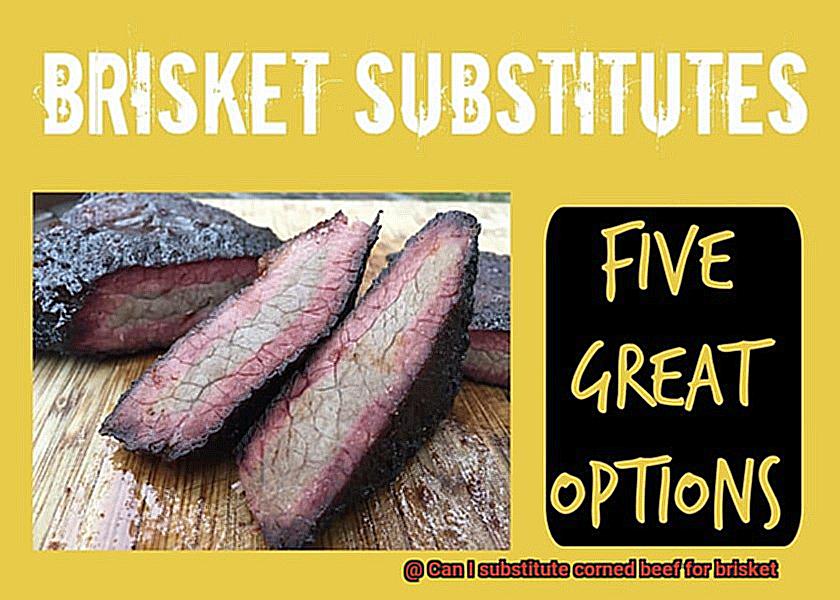
By following these tips, you can successfully substitute corned beef for brisket on the grill. However, it’s important to remember that the flavor profile will be different. If you’re looking for that hearty and beefy flavor, stick with brisket.
How to Prepare Corned Beef for Grilling or Smoking
The answer is yes, but there are some important things to keep in mind. Here are five sub-sections that will help you prepare corned beef for grilling or smoking:
Understanding the Differences between Corned Beef and Brisket:
Before you start preparing corned beef for grilling or smoking, it’s essential to understand the differences between these two cuts of meat. Corned beef is essentially brisket that has been cured in a mixture of salt, water, and various spices. This gives it a distinct flavor and texture that sets it apart from regular brisket.
Rinsing Off Excess Brine:
When using corned beef for grilling or smoking, it’s important to rinse off any excess brine before cooking. This will help remove any excess salt and prevent the meat from becoming too salty. Rinse the corned beef under cold running water for at least 5-10 minutes.
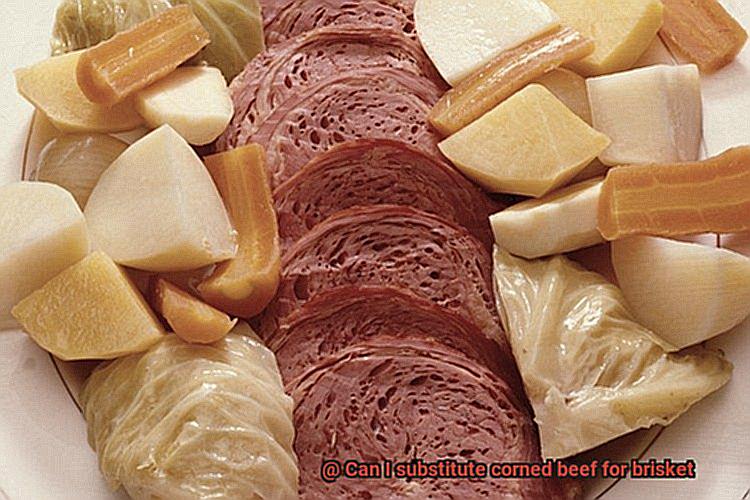
Adding Flavor with Seasonings:
Once the corned beef has been rinsed off, it can be seasoned and prepared just like brisket. Many people prefer to use a dry rub or marinade to add flavor to the meat before grilling or smoking. Some popular seasonings for corned beef include garlic, onion, paprika, and black pepper.
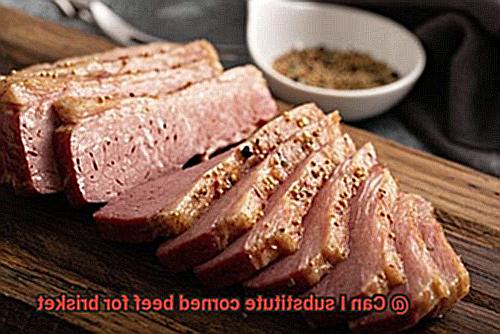
Cooking Low and Slow:
When grilling or smoking corned beef, it’s important to cook it low and slow. This will help ensure that the meat stays tender and juicy. Many people recommend using indirect heat when grilling or smoking corned beef, which means placing the meat on one side of the grill or smoker and placing a drip pan filled with water on the other side. This will help create a moist cooking environment and prevent the meat from drying out.
Soaking in Water:
One tip for preparing corned beef for grilling or smoking is to soak it in water for several hours before cooking. This can help remove some of the excess salt from the brine and make the meat more tender and flavorful. You can also add other seasonings or marinades to the soaking water to infuse even more flavor into the meat.
Seasoning and Marinades for Corned Beef
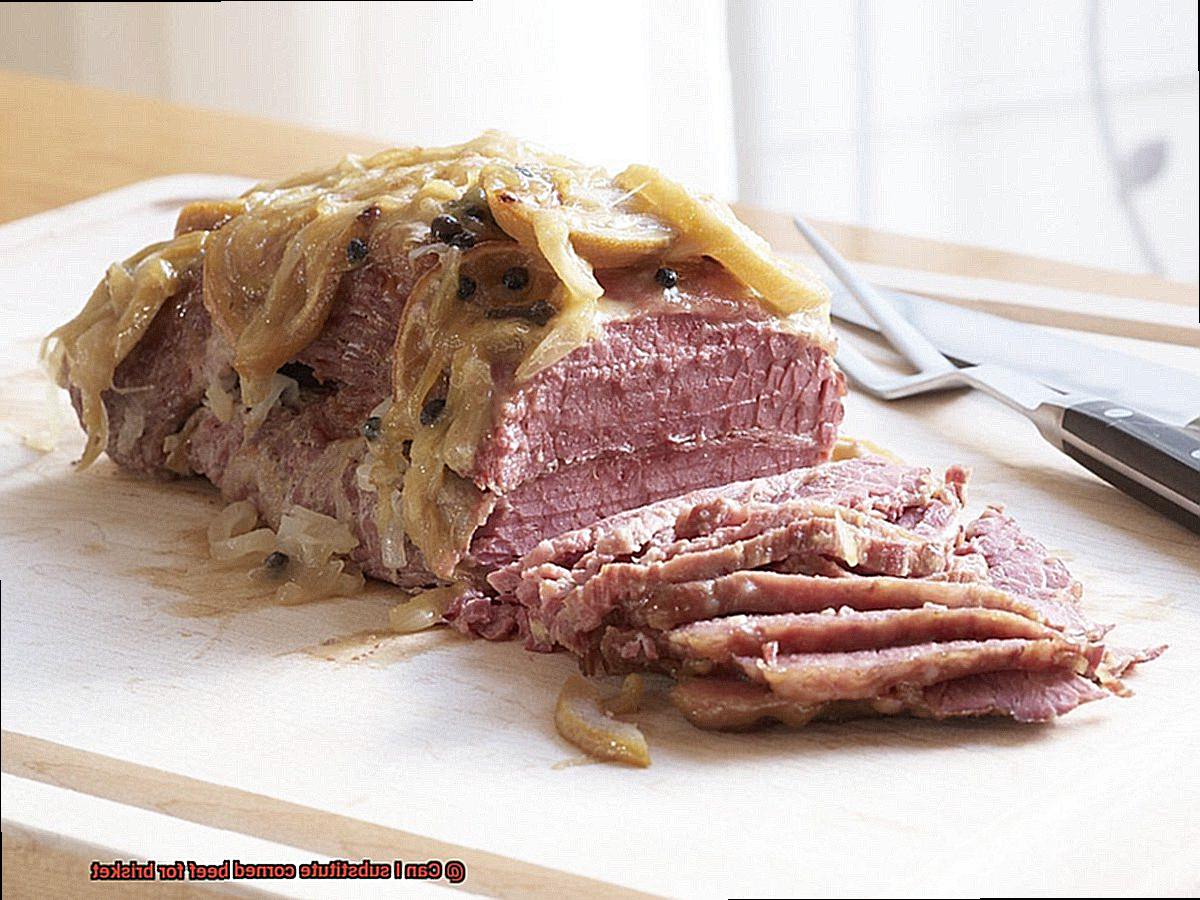
First, it’s important to remember that corned beef is already seasoned during the curing process. However, if you’re looking for additional flavor, there are plenty of options to consider.
One classic choice is a traditional Irish seasoning blend. This blend typically includes thyme, bay leaves, peppercorns, and allspice. To really enhance the dish, try adding fresh herbs like rosemary or sage. These herbs can provide a unique taste and aroma that will take your corned beef to the next level.
If you want to try a marinade, there are many options available. A simple marinade of olive oil, garlic, and lemon juice can add some brightness and freshness to the meat. Alternatively, a beer-based marinade can complement the rich and savory flavors of the corned beef.
It’s important to remember that corned beef is already quite flavorful on its own. Therefore, it’s best not to overpower it with too much seasoning or marinade. Marinating for a few hours should be sufficient to add some extra flavor without overwhelming the taste buds.
Tips for Cooking with Corned Beef Instead of Brisket
Corned beef is an interesting and flavorful cut of meat that can be substituted for brisket in many recipes. However, it’s important to keep a few tips in mind to ensure a successful outcome. Here are five sub-sections on how to cook with corned beef instead of brisket:
Soak the Corned Beef
As previously mentioned, corned beef is cured in a saltwater brine which can result in excess saltiness. To avoid this, soak the meat in water for at least 6 hours before cooking, changing the water every 2 hours. This will help to remove some of the excess salt and prevent the meat from becoming too salty.
Cook Low and Slow
Corned beef benefits from being cooked low and slow, just like brisket. This helps to break down the collagen in the meat and create a tender result. You can cook corned beef in an oven, slow cooker, or on a grill using indirect heat.
Add Additional Flavors
While corned beef has its own unique flavor, you can enhance it with additional flavors and seasonings. Consider adding herbs like thyme or rosemary, or using a flavored liquid like beer or apple cider vinegar in the braising liquid. Additionally, vegetables like cabbage, carrots, and potatoes can complement the flavors of the meat.
Watch the Temperature
When grilling corned beef, it’s important to keep an eye on the temperature to prevent it from drying out too quickly. Cook at a lower temperature and consider wrapping the meat in foil or placing it in a grill pan to retain moisture.
Slice Against the Grain
Slicing your cooked corned beef against the grain will create a more tender and flavorful result. This means slicing perpendicular to the lines of muscle fibers running through the meat.
SWu2wpvsA9o” >
Conclusion
In conclusion, the answer to the question “Can I substitute corned beef for brisket?” is a resounding yes. However, it’s essential to bear in mind that they have distinct preparation methods and flavors despite coming from the same cow part. Corned beef has a tangy taste due to being cured in saltwater with pickling spices. In contrast, brisket is slow-roasted, smoked, or braised until it reaches tender perfection and boasts a more robust and beefy flavor.
If you’re considering using corned beef instead of brisket, there are some factors to consider. Corned beef tends to be saltier and denser than brisket, necessitating adjustments to cooking times and seasoning. Nonetheless, with recipe modifications and creativity, corned beef can serve as an excellent alternative in stews, casseroles, sandwiches, and other dishes.
Whether you’re grilling or smoking corned beef instead of brisket or substituting uncooked brisket with corned beef in a recipe, there are tips and tricks to keep in mind. Soak the corned beef before cooking to eliminate excess saltiness; cook low and slow for tender results; add herbs or flavored liquids for extra flavor; monitor temperature carefully when grilling; slice against the grain for maximum tenderness.
Overall, substituting corned beef for brisket can yield delicious results with knowledge about their differences and proper preparation techniques.

